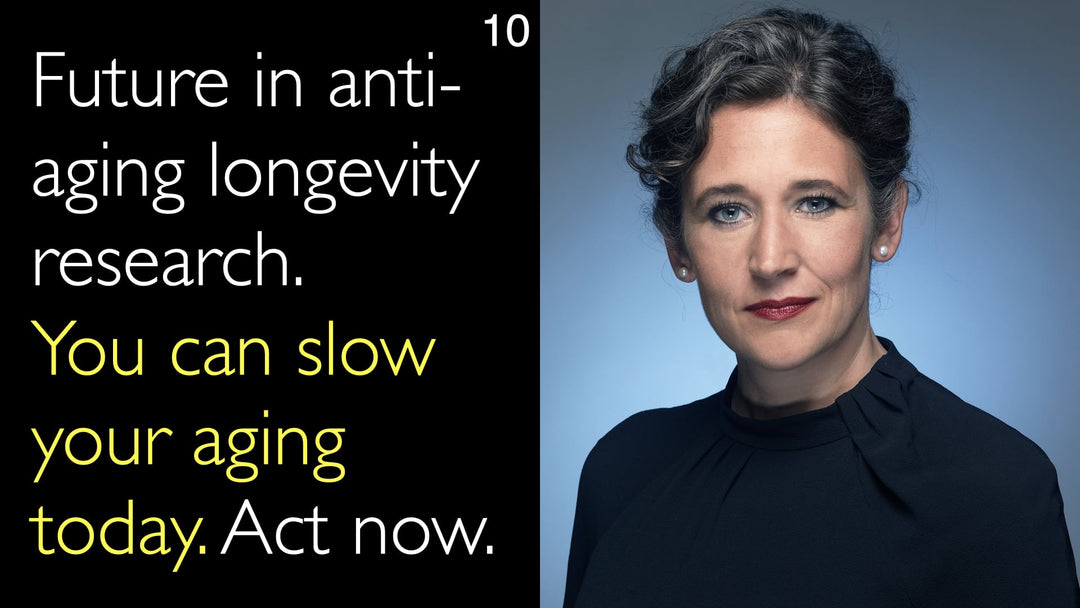Le Dr Anton Titov, MD, partage des stratégies pratiques pour prolonger l'espérance de vie en bonne santé.
Avancées Anti-Âge et Interventions par le Mode de Vie pour Ralentir le Vieillissement Dès Maintenant
Aller à la Section
- Avenir de la Recherche Anti-Âge
- Médecine de la Longévité en Pratique Clinique
- Interventions par le Mode de Vie pour le Rajeunissement
- Prise de Conscience Précoce des Changements Liés au Vieillissement
- Il n'est Jamais Trop Tard pour Changer
- Transcription Intégrale
Avenir de la Recherche Anti-Âge
Le Dr Andrea Maier, médecin, décrit l’évolution passionnante de la recherche anti-âge. Elle espère que le domaine passera de la théorie à une application clinique généralisée. De nombreux essais cliniques sur des composés anti-âge sont en cours, notamment sur des candidats bien connus comme la metformine et la rapamycine. L’intérêt croissant pour la science de la longévité accélère le développement d’interventions efficaces.
Médecine de la Longévité en Pratique Clinique
Spécialiste en médecine interne, le Dr Andrea Maier considère la médecine de la longévité comme un pilier essentiel de sa discipline. Son objectif est d’intégrer les pratiques de longévité fondées sur des preuves dans les soins cliniques courants d’ici trois à cinq ans. Un élément clé repose sur la capacité à détecter précisément l’âge biologique grâce à des marqueurs validés. Le Dr Maier et une communauté grandissante de spécialistes œuvrent à standardiser et à rendre ces avancées accessibles à tous, et non uniquement aux plus aisés.
Interventions par le Mode de Vie pour le Rajeunissement
Le Dr Andrea Maier souligne l’efficacité d’une approche non pharmacologique disponible dès aujourd’hui : l’intervention sur le mode de vie. Elle affirme qu’augmenter l’activité physique et réduire les comportements sédentaires peuvent directement rajeunir les cellules de l’organisme. Ces mesures sont prouvées pour réduire l’âge biologique à tout âge. Au cours de son échange avec le Dr Anton Titov, ces stratégies concrètes sont explorées, démontrant que des outils puissants pour ralentir le vieillissement sont déjà à notre portée.
Prise de Conscience Précoce des Changements Liés au Vieillissement
Le Dr Andrea Maier rappelle une vérité cruciale : le vieillissement commence très tôt. Le déclin fonctionnel est mesurable bien avant que des changements majeurs n’apparaissent à l’âge mûr. Elle conseille donc de prendre conscience de ces évolutions dès le plus jeune âge. Des mesures proactives précoces peuvent avoir un impact significatif sur la durée de vie en bonne santé. Cette vigilance est un principe fondamental pour une médecine de la longévité réussie.
Il n'est Jamais Trop Tard pour Changer
Le Dr Andrea Maier délivre un message résolument optimiste : il n’est jamais trop tard pour opérer des changements positifs. Elle cite des études menées auprès de nonagénaires et de centenaires, qui révèlent l’extraordinaire adaptabilité du corps. Des interventions comme la musculation et l’entraînement cardiovasculaire peuvent améliorer la condition physique même à un âge avancé. Le Dr Maier conclut en renforçant l’idée que d’excellents résultats sont possibles à tout âge en adoptant les bonnes pratiques.
Transcription Intégrale
Dr Anton Titov, médecin : Professeur Maier, quel est l’avenir de la recherche anti-âge ? Continuera-t-on à parler de metformine, de rapamycine ou de restrictions caloriques dans dix ans ? Quelles sont les perspectives ? D’où proviendront, selon vous, les prochaines avancées ?
Dr Andrea Maier, médecin : J’espère que nous passerons de la parole aux actes. C’est mon objectif en tant que médecin. Je suis spécialiste en médecine interne, et la médecine de la longévité en fait partie intégrante. Son application devrait relever du rôle des médecins généralistes, idéalement d’ici trois à cinq ans.
Cette intégration est réalisable en pratique clinique, car nous savons déjà détecter l’âge biologique. Nous maîtrisons désormais l’identification de marqueurs valides. Le diagnostic est une chose. Mais de nombreux essais cliniques sur des composés anti-âge sont en cours, et l’attention portée au domaine de la longévité est telle que nous pouvons aussi intervenir concrètement.
Il ne faut pas oublier que nous disposons déjà d’une action très puissante, non médicamenteuse : les interventions sur le mode de vie, que nous n’exploitons pas encore pleinement. Nous savons, par exemple, qu’augmenter l’activité physique et réduire les comportements sédentaires rajeunit les cellules. Cela fonctionne déjà.
Et nous savons qu’il est possible de réduire l’âge biologique à toutes les étapes de la vie. Mon ambition, avec mes collègues médecins internistes, neurologues, psychiatres, est de contribuer à structurer la médecine de la longévité. Une large communauté y travaille actuellement.
Nous l’intégrons dans la pratique clinique de manière standardisée, fondée sur des preuves, et à un coût abordable. J’espère que cela profitera à l’ensemble de la population, et pas seulement aux plus fortunés, car c’est un besoin universel.
Dr Anton Titov, médecin : Auriez-vous d’autres conseils, issus de votre expérience et de votre sagesse, à partager avec notre public ?
Dr Andrea Maier, médecin : Absolument. Je tiens à souligner que le vieillissement commence très tôt. Le déclin fonctionnel est déjà mesurable bien avant la quarantaine ou la cinquantaine, lorsque des changements majeurs deviennent visibles. Soyez donc attentif à ces évolutions dès un âge jeune.
Deuxièmement, il n’est jamais trop tard pour changer votre vie. Nous avons mené de nombreuses études, y compris sur des nonagénaires ou des centenaires, où des personnes très âgées ont décidé de retrouver la forme.
Prenez par exemple la musculation ou l’amélioration de la condition cardiovasculaire : même à un âge avancé, le corps s’adapte. Vous obtiendrez d’excellents résultats en agissant correctement. Le vieillissement est un continuum, mais il n’est jamais trop tard pour changer et commencer.
C’est un message optimistequ’il faut retenir, quel que soit son âge.
Dr Anton Titov, médecin : Merci beaucoup, Professeur Maier. Cette conversation a été extrêmement utile et instructive. Nous espérons vous retrouver prochainement pour de nouvelles actualités sur la recherche en longévité. Un grand merci !
Dr Andrea Maier, médecin : Merci de m’avoir invitée.




